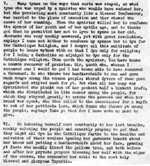
|
A Roman Catholic Martyr associated with Essex - St.Anne Line, 1601. There is a determined tradition in Great Dunmow that the widowed gentlewoman called Ann Line was arrested at Clock House for harbouring priests.82 Other sources have reservations about the Great Dunmow connection, although this lady is usually said to be of Essex.83 Whatever the precise nature of the link, here is an Essex martyr from the other side of sixteenth century religious persecution. Despite being weakened through sickness and though she was of middle age, her resolve to be constant to her faith was none the less than that of the young and vigorous William Hunter. She too was given repeated opportunity to be persuaded of the folly of her ways. She 'was not able to do one step without help' when it came to the transfer from Newgate prison to the executioner's cart and thence to the gallows. When berated by the accompanying minister for being a common receiver of priests she retorted "I would to God I had been able to receive a thousand!" She too faced death with equanimity, although she commended her soul to the blessed and glorious Trinity. Is it possible, or even desirable, to compare the impact of Roman Catholic persecution of Protestants with that of Protestants upon Roman Catholics, whenever the tables were turned? Can religious enthusiasm be weighed in the balance? Does not the study of History suffer when it enters into the realm of faith? Partisan views seem to triumph too easily here. Does a crude comparison of the figures of martyrdom settle anything? Would we better consign the difficulties with religion to an historical 'no-go' area? That the Tudor age was one of increasing enlightenment there is no doubting - voyages of European exploration and all that. Equally it has its darker sides, like religious persecution, which we ignore perhaps at our own peril. There were punitive fines for Roman Catholics under the Queen who would not open a window into men's souls, (particularly after the Papal Bull of February 1570, Regnans in Excelsis, which excommunicated Elizabeth I). The 1581 Act 'to retain the Queen's majesty's subjects in their due obedience' laid down a fine of 200 marks for saying mass and a year in prison and for hearing it was punished by a fine of 100 marks and the same length of imprisonment. It is clear that hurt and bravery were not monopolised by any one religious persuasion. We may all feel the thrill of the hunt and the hunted in John Gerard's account of pursuivants thoroughly but vainly searching Mrs.Wiseman's house at Braddocks in Essex for the critical priest's hole.84
|
||||
 |
